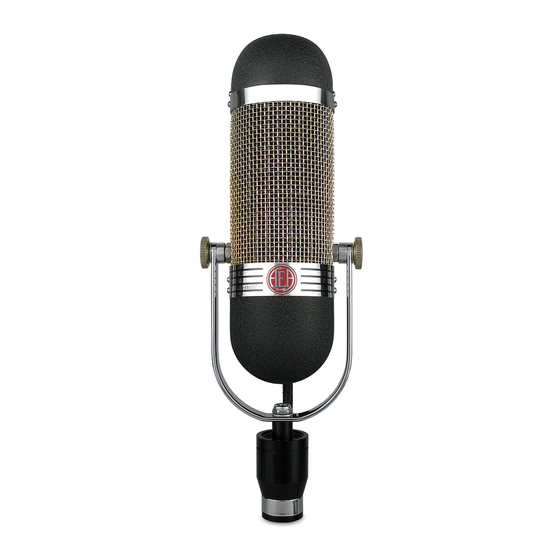
AEA r84 Owner's Manual
Classic passive ribbon mic inspired by the 44
Hide thumbs
Also See for r84:
- Owner's manual (13 pages) ,
- User manual (8 pages) ,
- Owner's manual (12 pages)
Table of Contents
Advertisement
Quick Links
Download this manual
See also:
User Manual
Advertisement
Table of Contents

Summary of Contents for AEA r84
- Page 1 ribbonmics & preamps since 1964 www.ribbonmics.com | tel: +1-626-798-9128 | fax: +1-626-798-2378 CLASSIC PASSIVE RIBBON MIC INSPIRED BY THE 44 OWNER’S MANUAL Revision 4, April 2016...
-
Page 2: Welcome
R84 is a sensibly priced Big Ribbon™ microphone which delivers high performance and value. Call it a “Swiss army knife”, your “desert island mic”, or simply “the workhorse” – the R84 was designed to be flexible and practical in a myriad of recording settings. Developed to have a... -
Page 3: Table Of Contents
TABLE OF CONTENTS WELCOME INTRODUCTION GENERAL GUIDELINES APPLICATION ADVICE “This Side” vs. “That Side” Controlling Leakage Proximity Effect Preamps APPLICATION EXAMPLES Vocals Acoustic Guitar Electric Guitar Brass & Woodwinds Strings Piano Drums & Percussion PRECAUTIONS Phantom Power Wind Gusts Tramp Iron Magnetic Stray Fields Microphone Positioning SPECIFICATIONS... -
Page 4: Introduction
With improvements in ribbon technology and manufac- turing since the 30’s and 40’s, AEA engineered the R84 to be more efficient, lighter and less expensive. Designed to accommodate distant and medium miking duties, it exhibits a flat frequency response when placed 3 feet (1 meter) away from the source. -
Page 5: Application Advice
APPLICATION ADVICE “This Side” vs. “That Side” Here is an illustration of the pickup pattern of the R84. The AEA logo on the front of the R84 points directly towards the ‘principal axis’ (+) indicated in the diagram. -
Page 6: Controlling Leakage
Since the R84 is bidirectional, it exhibits nulls at right angles to the principal axis. These nulls produce a “plane of rejection” around the sides, top and bottom of the mic that can be used effectively to reduce leakage. -
Page 7: Preamps
The R44’s proximity effect begins at six feet (1.8 M) and can become huge. The RCA 44 was developed when studios were larger and mics were rarely used close up. The R84 has a more moderate proximity effect, better suited for closer use in contemporary studios. Designed... -
Page 8: Application Examples
Vocals Our experience with the R84 is that it sounds best on vocals when used at a distance of 6 to 24 inches (15-60 cm). However, you may find that positioning the microphone closer or further away from the singer yields better results depending on the voice, the room or the musical style. -
Page 9: Acoustic Guitar
R84 at an angle. You will find that small differences in positioning can make huge differences in the sound, so experiment until you find the spots you like. Close up, the R84 is very good at spotlighting a speaker’s unique sounds at various locations. -
Page 10: Brass & Woodwinds
(1-2 m) on axis towards the sound hole. To achieve a balanced string group sound, try placing the R84 5 to 8 feet (2-3 m) away (either in front or above) from the section. Use the R84’s exceptional null points to isolate the R84’s pick up from other sources. -
Page 11: Piano
For mono drum room, start by positioning your R84 at head level 9 feet (3 m) in front of the kit. Depending on the size of the room and kit arrangement, you may want to position the R84 further away if you wish to capture more room ambiance. -
Page 12: Precautions
Pacific Pioneer Broadcasters in Hollywood) sounds as good today as it did when he recorded his radio broadcasts in the 1940s. A few simple precautions will help you to keep your AEA R84 working well for life. Phantom Power Phantom power is not required or recommended for passive ribbon mics. -
Page 13: Tramp Iron
The best prevention is to keep the microphone covered with the supplied plastic bag when it is not in use. The R84 was designed to be less sensitive to external interference. Its design attracts less “tramp iron” while retaining the overall sound and 20 Hz bass response of the original RCA 44. -
Page 14: Microphone Positioning
Guitar players will know this phenomenon from single-coil pickups. Even though much attention was paid to suppressing such sensitivity to external magnetic fields in the design of the R84, it is still possible that you might encounter this problem. If you should pick up... -
Page 15: Accessories Included
3 lb (1.36 kg) Shipping Weight: 4 lb (1.8 kg) Connector: XLR-3M R84 Frequency Response Data below 200 Hz omitted due to measuring room restrictions. 0 dBr is equivalent to 2.5 mV/Pa at 1kHz. Normalized to 0 dBr at 1kHz. Accessories Included: Vertical softcase, user manual, captive 10”... -
Page 16: Warranty
500Hz 180° 200Hz WARRANTY Your R84 microphone comes with a one-year limited warranty on parts and labor, shipping not included. Please see the supplied warranty card for details. Registering your microphone with AEA will extend the warranty to a full three years.
















Need help?
Do you have a question about the r84 and is the answer not in the manual?
Questions and answers